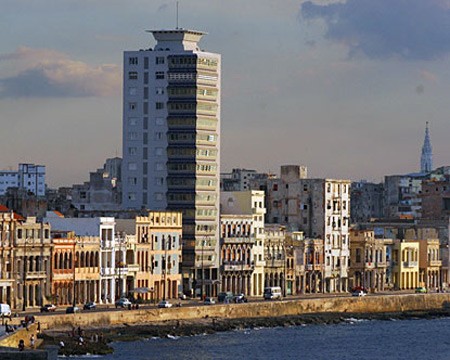(VOVworld) February 7th marks 50 years of the US embargo policy against Cuba. After 9 US Presidents’ terms of office, the embargo appears increasingly absurd and outdated, representing the US’s failure to sabotage the Cuban socialist revolution.
 |
| Cuba, a beautiful and potential country |
A report by the US Government Accountability Office (GAO) says the anti-Cuba embargo is the most severe of the 20 embargoes the US has imposed on other countries. Observers say it is the most comprehensive and longest sanction on a sovereign nation. According to the Cuban government, the 50- year-old embargo has cost the Cuban economy 975 billion USD, not to mention the fact that Cuba is not allowed to export or import goods to or from the US, use the US dollars in foreign transactions or access major international financial institutions. But widespread public opinion in the US is that the sanctions hurt Americans as much as they do Cubans. American companies are unable to work with oil-rich Cuba and these opportunities have been forfeited to foreign companies.
Politically, the 1962 anti-Cuba embargo has stirred animosity between the US and Latin American nations, a region that has been called the US’s “backyard”. A majority of Latin American leaders view the embargo as a grave interference in Cuba’s self determination, showing that US wants to “make policy for Latin America” rather than with Latin America”. Early this month, 33 nations officially established a Community of Latin American and Caribbean States (CELAC). The organization to which Cuba belongs but the US does not, endorses a credo of respecting democracy, sovereignty and territorial integrity of its members. It pledges not to use or threaten to use violence, protect the environment, human rights, and international laws and to create peace and security in the region. With the birth of CELAC, the US’s former “vassal” nations have clearly shown their solidarity with Cuba.
The majority of the 190-member United Nations have over the past 20 years repeatedly urged Washington to lift its embargo against Cuba. In an October 2010 vote, the UN General Assembly once again expressed its support for Cuba and called for an end to the US’s unilateral sanctions against its neighbor. Observers say the embargo is counter-productive because Cuba keeps growing resiliently with a 2.7% economic growth in 2011. International organizations note that Cuba has outperformed the US in such areas as general health care, and tertiary and general education. Obviously, the US has failed to attain its goal of undermining Cuba’s revolution. Some American politicians have recently pointed to the improvement of bilateral ties with Cuba as an inevitable trend. During his 3 years in office, US President Barack Obama has sought to ease the sanctions by waiving a ban on remittances and visit to Cuba by Cuban-Americans, allowing a resumption of talks on correspondence and immigration services, and restoring discussions of possible educational cooperation. But some consider such moves “throwing salt into the sea” and say the embargo become badly outdated and should be lifted immediately.
Hong Van